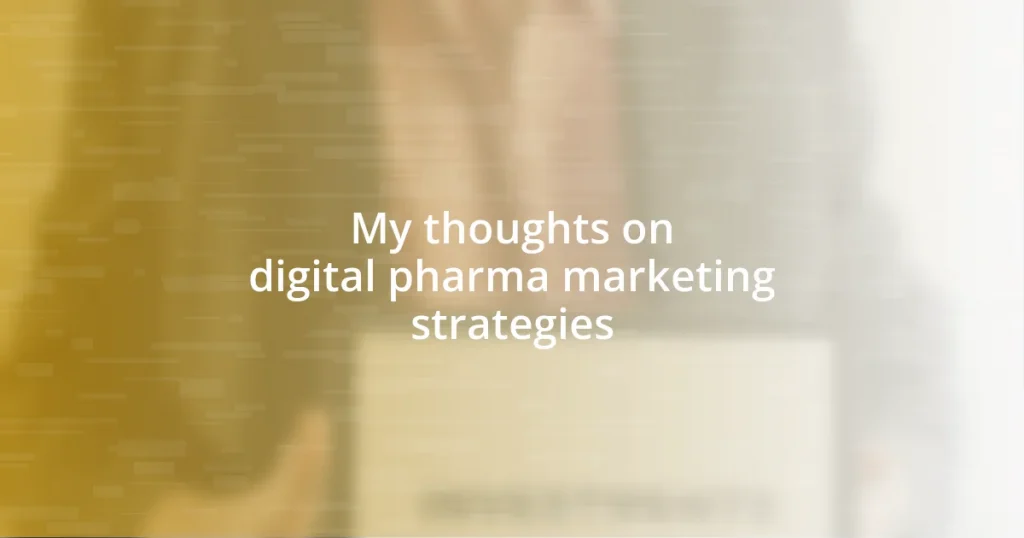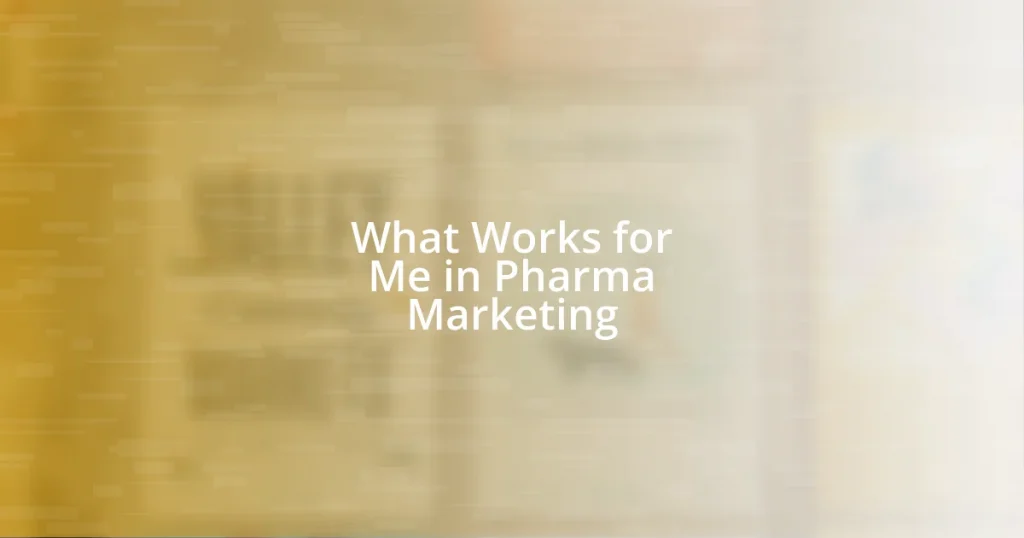Key takeaways:
- Digital pharma marketing leverages data analytics for personalized outreach, enhancing engagement and trust among patients and healthcare professionals.
- Effective use of social media fosters community support and transparency, empowering patients with knowledge and encouraging real-time interaction.
- Emerging trends such as AI, omnichannel marketing, and sustainability are shaping the future of pharma marketing, enhancing connection and engagement with consumers.
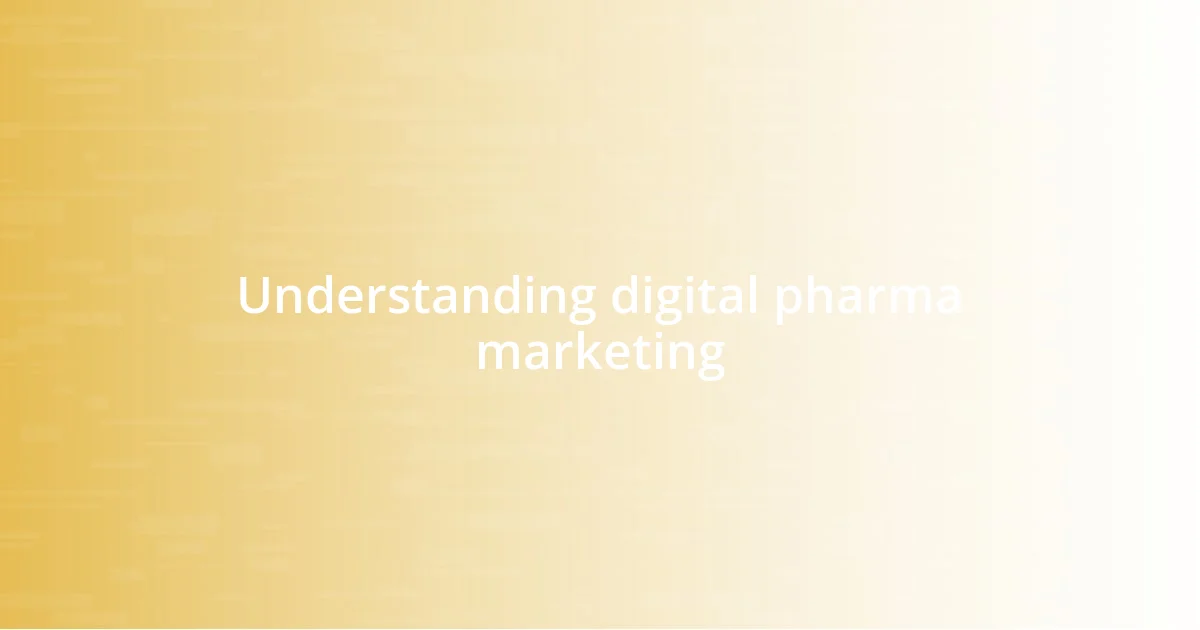
Understanding digital pharma marketing
Digital pharma marketing has transformed how pharmaceutical companies connect with healthcare professionals and patients. I remember the first time I was intrigued by a targeted online ad for a medication that addressed a concern I had. It struck me how precisely these campaigns could reach individuals seeking solutions—because when it comes to health, timing and relevance are everything.
One key aspect of digital pharma marketing is its ability to leverage data analytics. Companies can track user behavior and preferences, which allows for personalized messaging and more effective outreach. Have you ever wondered why certain brands seem to “know” you? That’s the magic of data—marketers can tailor content to resonate with specific audiences, making their campaigns feel more authentic and engaging.
Another fascinating element is the role of social media. I’ve seen firsthand how platforms can foster community discussions around certain health issues. These discussions are not just about promoting products; they create opportunities for education and support. Isn’t it heartening to think that, through digital marketing, we can empower individuals with information and resources right when they need them?
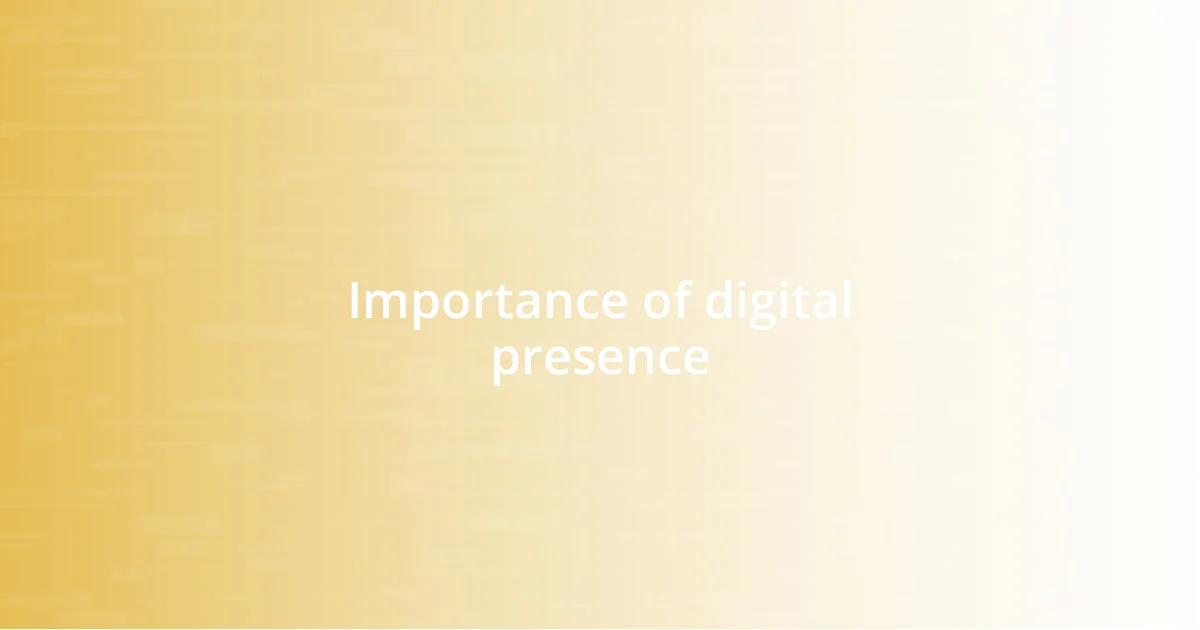
Importance of digital presence
Building a strong digital presence is essential in today’s pharmaceutical landscape. I recall attending a webinar where a leading pharma marketer shared how a well-optimized website significantly improved patient engagement. It highlighted to me that an effective online platform isn’t just about aesthetics; it’s a crucial hub where patients and healthcare professionals can find reliable information. When patients can easily navigate and access valuable content, it fosters trust and encourages them to reach out for help.
The importance of digital presence extends beyond just having a website. Social media channels have become vital platforms for real-time interaction and feedback. I once shared a personal health journey on a pharma-related online group, and the supportive responses made me realize how powerful digital engagement can be. It’s not simply about promoting medication; it’s about cultivating a sense of community and support. Companies that embrace this strategy can enhance their reputation while providing important resources to those in need.
Additionally, the ability to respond swiftly to inquiries or concerns in the digital realm gives companies a competitive edge. I’ve experienced how a prompt reply on a social media platform can turn an uncertain moment into one of reassurance. I often ponder how much more confident I feel when a brand actively engages with me online, addressing my questions and concerns. This level of responsiveness translates not only to improved customer satisfaction but also to brand loyalty that is hard to shake.
| Key Benefits | Impact on Patients |
|---|---|
| Engagement | Increases trust and communication |
| Community Building | Creates support networks for patients |
| Real-time Interaction | Enhances responsiveness and satisfaction |
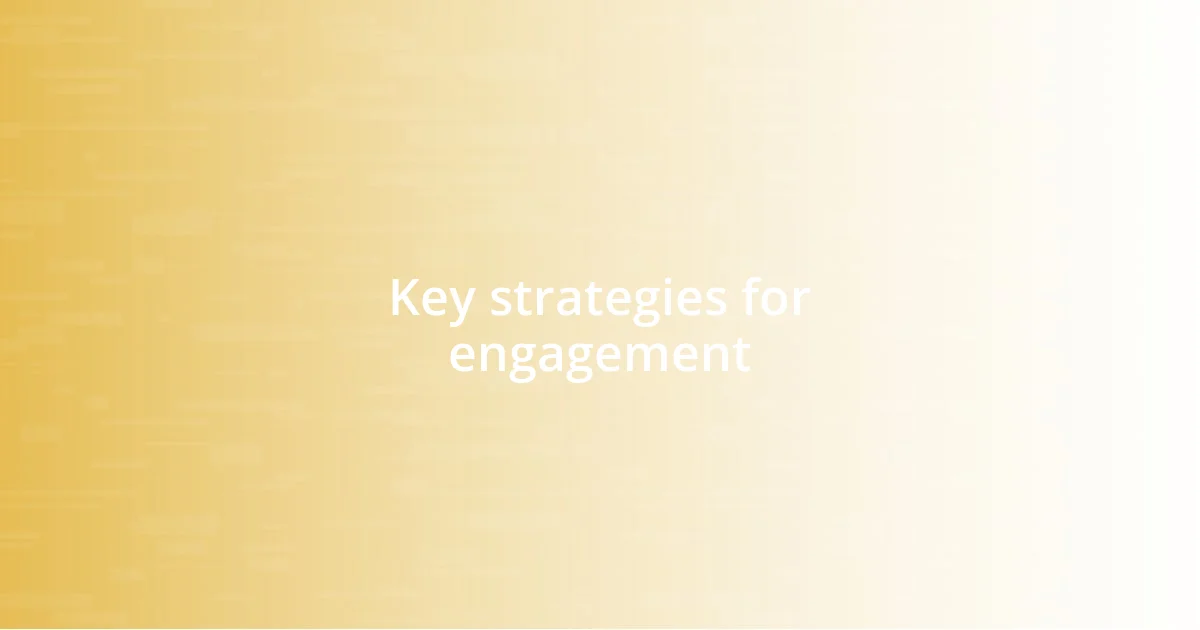
Key strategies for engagement
One of the most effective engagement strategies I’ve observed in digital pharma marketing is the use of interactive content. I recall participating in a polling feature on a health-related website that asked about my experiences with a specific condition. It was exciting to know that my opinion mattered, and it made me feel connected not only to the brand but also to others facing similar challenges. This kind of interaction fosters a deeper relationship, ensuring that the audience feels valued and heard. Here are some key strategies to enhance engagement:
- Personalization: Tailor content based on user preferences and behaviors.
- Interactive Features: Use quizzes, polls, and surveys to encourage active participation.
- Multi-platform Approach: Engage users on various channels—social media, email, and websites—to maximize reach.
In a rapidly evolving digital landscape, storytelling emerges as a powerful engagement tool. Reflecting on my own experiences, I remember reading a heartfelt blog post from a patient who shared their journey with a chronic illness. The authenticity struck a chord with me, revealing the human side of pharmaceuticals often obscured by clinical language. It’s this emotional connection that can captivate audiences, making them not just consumers but advocates for the brand. Consider these methods to forge stronger connections:
- Patient Stories: Share real-life experiences to humanize your brand.
- Video Testimonials: Utilize visuals to convey genuine emotions and messages.
- Educational Content: Provide informative articles and resources that empower patients to make informed decisions.
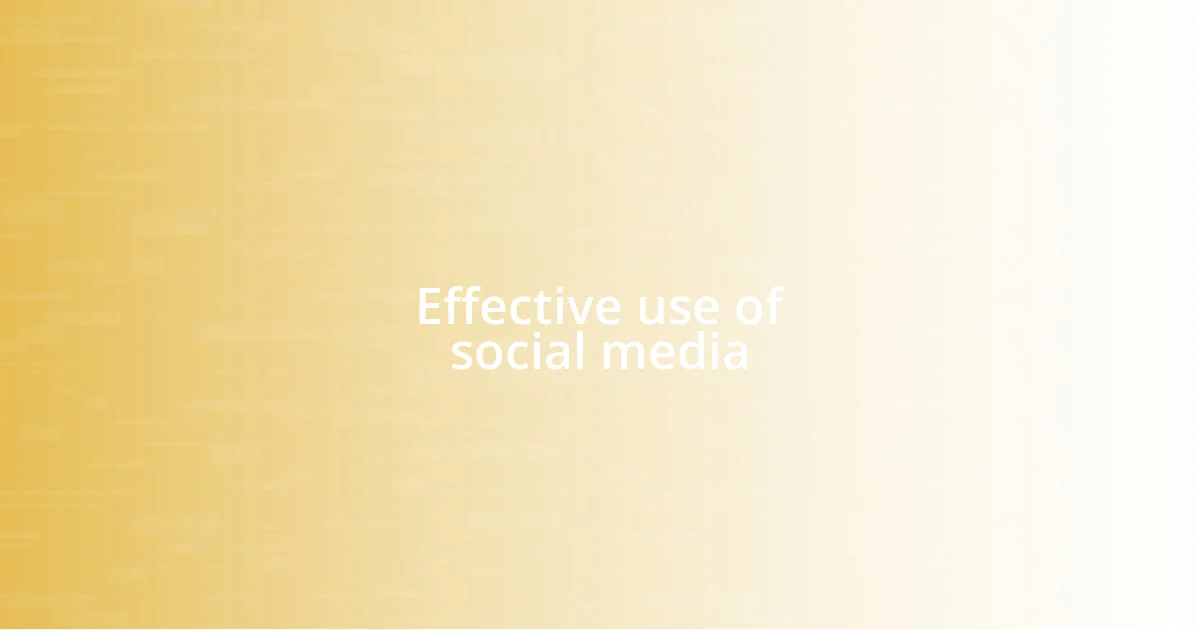
Effective use of social media
Using social media effectively in pharmaceutical marketing can transform how companies communicate with both patients and healthcare professionals. I remember scrolling through Facebook and coming across a campaign that encouraged users to share their health stories. It was inspiring to see the wave of support and solidarity that ensued in the comments. This kind of interaction not only builds community but also fosters trust, proving that social media can be a powerful tool for cultivating genuine connections.
In my experience, transparency is key when engaging on these platforms. I once saw a Twitter thread where a pharmaceutical company shared real-time updates about a product recall. Their straightforward approach reassured many worried customers about what steps to take next. It made me reflect on how crucial it is for brands to communicate openly during times of uncertainty. How many of us have felt more connected to a brand that doesn’t shy away from tough conversations? That honesty can be the differentiator in a crowded market.
Moreover, it’s interesting how social media provides an opportunity for educational content. I stumbled upon an Instagram post that broke down complex medical terms into relatable language. This post not only educated me but also engaged me in a conversation with others who had questions. Have you ever found a resource online that made you feel empowered? That’s precisely the kind of impact social media can have. By arming patients with knowledge, companies can position themselves as trusted allies in the healthcare journey.

Leveraging data analytics
When I think about leveraging data analytics in digital pharma marketing, I can’t help but reflect on the sheer power of understanding consumer behavior. I remember attending a webinar where a marketer discussed how they analyzed user data to determine which health topics resonated most with their audience. This insight led them to create targeted content that not only increased engagement but also improved conversion rates. It’s intriguing to see how data can inform and enhance marketing strategies, allowing companies to reach users with precision.
One memorable experience I had involved a pharmaceutical app that utilized data analytics to personalize my health experience. After I entered some basic information, I began receiving tailored content about managing my condition. Honestly, it felt like the app knew me, almost anticipating my needs. Have you ever encountered a service that seemed to get you just right? This use of analytics to create a personalized journey made me feel valued as a patient, which in turn increased my loyalty to the brand.
In the realm of digital marketing, the integration of data analytics doesn’t just enhance targeting—it highlights trends that could shape future strategies. I recall a discussion with a colleague on how adaptive marketing approaches respond to real-time data. We were fascinated by how one company adjusted its campaign mid-flight based on feedback and engagement metrics. It’s like having a compass that helps navigate through the ever-changing landscape of consumer preferences! Are we tapping into the full potential of our data? I believe utilizing analytics in such a dynamic way can significantly bolster our efforts and provide insights into evolving patient needs.

Measuring marketing success
When it comes to measuring marketing success in the pharmaceutical industry, I’ve found that metrics can tell a story far beyond mere numbers. I remember collaborating with a team that relied heavily on key performance indicators (KPIs), such as engagement rates and conversion percentages. We discovered that understanding the patient journey, from initial awareness to final decision-making, was pivotal. Isn’t it fascinating how the right metrics can illuminate the paths people take in their healthcare decisions?
Something that really struck me was the power of qualitative data, which often gets overshadowed by statistics. I once analyzed feedback from a focus group after a campaign launch, and their insights were gold. One participant shared how the campaign had finally made them feel seen and understood. That human connection behind the data can often reveal why a campaign is successful or where it may have fallen short. Have you ever taken a moment to reflect on how emotional responses can drive actions in ways that numbers alone might miss?
Finally, I love using A/B testing as a practical method for fine-tuning marketing efforts. I vividly recall experimenting with two different email newsletters: one focused on educational content and the other on promotional offers. The insights we gained were eye-opening! The education-driven newsletter led to more meaningful conversations with recipients, while the promotions drew quick clicks but lower engagement in the long term. Isn’t it interesting how subtle changes in approach can yield markedly different results? In my experience, understanding these nuances not only boosts engagement but fosters lasting relationships with patients and healthcare professionals alike.

Future trends in pharma marketing
When I consider future trends in pharma marketing, I can’t help but think about the rising role of artificial intelligence (AI). I remember a conference where the speaker highlighted an AI tool that analyzes social media trends to predict the next big health concerns. Watching the audience react, it struck me how AI could potentially reshape the way we connect with patients. Have you ever imagined what it would be like if AI could help personalize treatment pathways before patients even knew they needed them?
The concept of omnichannel marketing is also intriguing. I had an experience recently where I was contacted via email, then received a follow-up text, all about a health seminar I registered for. It made me realize how interconnected our marketing experiences can be. What if pharma companies could create such seamless journeys for patients across all platforms? This could drastically improve not only engagement rates but also foster a sense of trust and reliability.
Sustainability in marketing practices is another trend I see on the horizon. A few months ago, I learned about a firm that began incorporating eco-friendly practices into its promotional materials. The sense of purpose it created resonated with many, including myself. It’s fascinating to observe how genuine efforts to connect with today’s environmentally-conscious clientele can create brand loyalty. Are we ready to embrace this change and align our values with those of our audience? Engaging with sustainability in our marketing strategies not only addresses consumer expectations but also fosters a more profound connection with the community.










